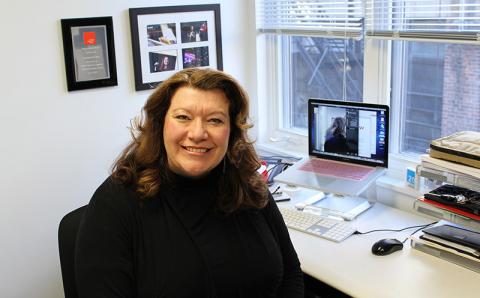VIDEO: Andrea Johnson Ignites Music Business Students

Andrea "Ani" Johnson, Berklee associate professor of music business/management
Photo by Mike Keefe-Feldman
With extensive music industry experience, Berklee associate professor Andrea Johnson has a talent for engaging students in experiential music business learning. Johnson has founded a production company, worked with Gloria Estefan and Island Records founder Chris Blackwell at Palm Pictures, and has also worked in music licensing, A&R, and songwriting, all of which has helped make her nimble on her toes in the midst of a very volatile period in the history of the music industry.
“This is a time of a lot of disruption, which is good, because we’re seeing a lot of creativity come out of this,” Johnson says. “This is why we’re seeing so many startups that are trying to figure out what about these models works and what doesn’t work.”
In particular, Johnson is energized about discussing the recent rise of streaming music models. She notes, “Businesses need to value the content and realize that without that content, they wouldn’t have a business. I’m training students here at Berklee to think equitably and to understand that the partnership has to work for both parties.” She adds, “We spend a lot of time strategically and creatively thinking about this, because these students are the next music executives.”
Watch Johnson discuss her approach to teaching in this video:
In addition to exploring new models, Johnson also immerses students in the history of the music business in hopes that, in the future, we may learn from the successes and mistakes of the past.
“In Record Company Operations, we talk about distribution and the traditional models of record labels, newer models like the 360 deals, and the models that the industry is hopefully moving toward in the future,” Johnson says.
Get a look at Johnson’s Record Company Operations course in this video:
Of her work at Berklee, Johnson says, “I am absolutely thrilled to be a professor here because we all value music so much.”
“Because I’ve worked in the industry and have seen all of these models, I’m able to show these to students and say, ‘You decide. Which one of these has worked, which has failed, and why?’” Johnson says. “We have great discussions, and a lot of it comes down to one’s philosophy. How do you treat other people? How should corporations treat their communities of users? I couldn’t have a better job.”
Johnson says that the nature of these class discussions generally leave her feeling optimistic about the future of the music industry: “I think the Millennials coming up are really going to change the way that the industry respects artists and values music.”
